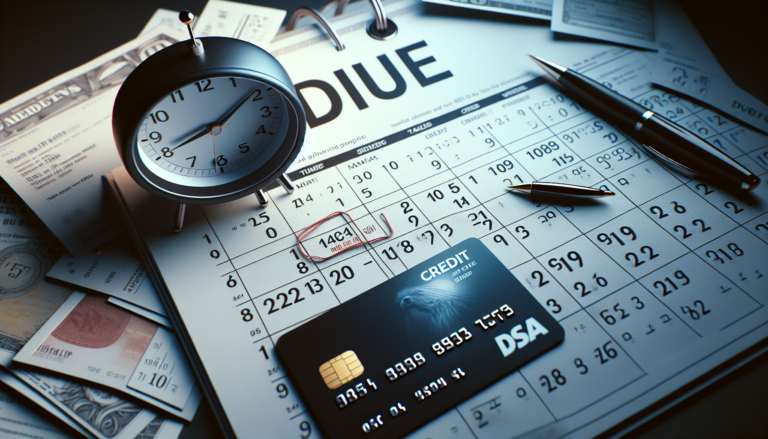Late payments on credit cards can have serious consequences, from hefty fees to long-lasting impacts on your credit score. Understanding when a credit card payment is considered late is crucial for maintaining good financial health and avoiding these negative repercussions. In this article, we’ll dive into the details of late credit card payments, their effects, and strategies to prevent them.
Understanding When a Credit Card Payment is Considered Late
Definition of Late Credit Card Payment
A credit card payment is generally considered late if it is not received by the issuer before or on the due date specified on your billing statement. Payment due dates are typically the same each month, making it easier to remember when your bill needs to be paid. However, if the due date falls on a weekend or holiday, the payment may not be processed until the next business day.
It’s important to note that most credit card issuers offer a grace period, which is the time between the end of your billing cycle and the payment due date. As long as you pay your balance in full within this grace period, you can avoid interest charges on your purchases.
Consequences of Late Payments
Late credit card payments come with several consequences that can hurt your wallet and your credit. One immediate effect is late payment fees, which can be up to $40 per occurrence, depending on your issuer and whether it’s a first-time or repeated offense.
Moreover, late payments can trigger penalty APRs, significantly increasing the interest rate on your credit card balance. This higher rate can apply to both existing balances and new purchases, making it more difficult to pay off your debt.
Perhaps most importantly, late payments can severely impact your credit score. Payment history is the most significant factor in calculating your credit score, and even a single late payment can cause your score to drop substantially.
Impact of Late Payments on Credit Scores
How Late Payments Affect Your Credit Score
Your payment history accounts for approximately 35% of your FICO credit score, making it the most influential factor. Late payments are reported to credit bureaus once they are 30 days past due, and they can remain on your credit report for up to seven years.
The severity of the impact on your credit score depends on several factors, such as:
- How late the payment was (30, 60, 90, or more days)
- Your current credit score (higher scores may see a more significant drop)
- The number of other negative marks on your credit report
Duration of Late Payments on Credit Reports
Late payments can linger on your credit reports for a long time. Here’s a breakdown of how long different types of late payments can stay on your record:
| Late Payment Type | Duration on Credit Report |
|---|---|
| 30 to 59 days late | Up to 7 years |
| 60 to 89 days late | Up to 7 years |
| 90 to 119 days late | Up to 7 years |
| 120+ days late | Up to 7 years |
| Charge-offs | Up to 7 years from the original delinquency date |
| Collections | Up to 7 years from the original delinquency date |
While the impact of late payments on your credit score diminishes over time, it’s best to avoid them altogether to maintain a healthy credit profile.
Preventing Late Credit Card Payments
Setting Up Automatic Payments
One of the most effective ways to prevent late credit card payments is to set up automatic payments through your issuer. You can typically choose to pay the minimum amount due, a fixed amount, or your full balance each month. Automatic payments ensure that you never miss a due date, helping you avoid fees and negative credit reporting.
Understanding Your Grace Period
Familiarizing yourself with your credit card’s grace period can help you manage your payments more effectively. The grace period usually lasts 21 to 25 days after the close of each billing cycle. If you pay your balance in full within this period, you can avoid interest charges on your purchases.
Keep in mind that cash advances and balance transfers often do not have a grace period and start accruing interest immediately.
Making at Least the Minimum Payment
If you can’t pay your full balance, it’s crucial to make at least the minimum payment by the due date. While paying only the minimum can lead to interest charges and prolong your debt, it prevents your account from being reported as delinquent to credit bureaus.
Consider setting up a reminder or using budgeting apps to ensure you never miss a minimum payment deadline.
What to Do If You Miss a Payment
Contacting Your Credit Card Issuer
If you accidentally miss a credit card payment, contact your issuer as soon as possible. Many issuers offer a grace period or late payment forgiveness, especially for first-time offenses. Explaining your situation and requesting a fee waiver can sometimes result in the removal of late payment penalties.
Negotiating Late Payment Fees
Even if you don’t qualify for late payment forgiveness, you may still be able to negotiate a reduction in late payment fees. Be polite and honest when communicating with your issuer, and emphasize your history of timely payments if applicable. Some issuers may be willing to waive or reduce fees as a goodwill gesture, particularly for loyal customers.
Monitoring and Managing Your Credit
Regularly Checking Your Credit Reports
Monitoring your credit reports regularly can help you identify potential issues, such as late payments or inaccurate information. You are entitled to one free credit report from each of the three major credit bureaus (Equifax, Experian, and TransUnion) every 12 months. Visit AnnualCreditReport.com to request your free reports and review them for errors or signs of identity theft.
Using Credit Monitoring Services
In addition to checking your credit reports annually, consider using credit monitoring services to keep tabs on your credit throughout the year. Many services offer real-time alerts whenever changes occur on your credit report, such as new accounts or inquiries. Some credit card issuers and personal finance platforms offer free credit monitoring, making it easy to stay informed about your credit health.
By understanding when credit card payments are considered late, the consequences of missed payments, and strategies for preventing and addressing late payments, you can take control of your credit and maintain a strong financial foundation.
See also:
- What Happens If I Miss a Credit Card Payment? Find Out Now
- How Is Credit Card Minimum Payment Calculated? Understanding the Process
- How Long Does It Take for Credit Card Payment to Post?
- How to Lower Minimum Payment on Credit Card: Tips and Strategies
- How to Cancel Credit Card Payment: Step-by-Step Guide






